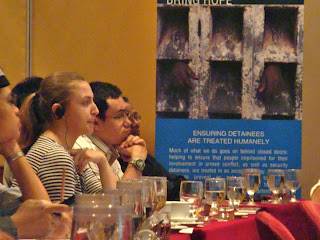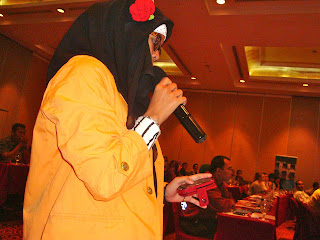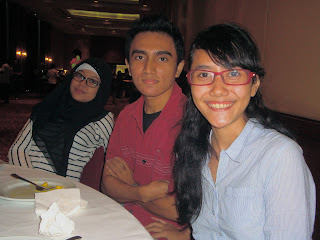 |
| ZeroNine with Pak Denny |
 |
| ZeroNine |
 |
| The audiences |
 |
| Follow @icrc_jakarta |
 |
| Me asking question |
 |
My classmates
ZeroNine from Universitas Jayabaya and I were attending Roundtable discussion organized by International
Committee of the Red Cross 17 November 2011 in Redtop Hotel Jakarta. The
discussion was about Cyberwarfare : How does IHL regulate it?
The speakers were Mr.
Aswin Sasongko From Direktorat Jenderal Aplikasi Informatika ( Ministry of
Communication and Information) , Mr. Kusnanto Anggoro (The University of
National Defense) , Mr.Richard Desgagne (ICRC) and Ms.Emily Crawford
(University of Sydney).
First Vincent Nicod from ICRC delivered his speech, here is
the summary:
-Long before Henry, the great figures including religious
leaders already have the idea to limit the tools and how to fight
-
He quoted Abu Bakar Ash
Siddiq : “ When you fight for a glory of God, act like a man never turning back
…”
-
ICRC doesn’t know the
worst effect from cyber warfare but principles of distinction and proportionate
should remain in respect
-
International
Humanitarian Law (IHL) provides adequate guarantees for the protection of
civilians, including the threat posed by cyber warfare
The second person
who delivered the speech was Prof. Dr. Budi Susilo.S Governor of National
Defense Institution, here is the summary :
-
Military threats are Defense and Security
1. Threat to trigatra elements:
geographic: Indonesia is very strategic position
Protecting boundaries with information technology
natural resource potential of IT
population data as a strategy and IT security systems
2. Aspects pancagatra
by IT threatens the destruction of the cyber world of the
military
-Defense resilience: IT systems to cripple the enemy,
demoralizing war in moral, political, etc.
Application of humanitarian law:
At the beginning of the 20-21 century we should think of
technology in the international rules in cyber attacks, cyber terrorism and
cyber auctation
The principle of distinction: the distinction between society
and civilian objects and military
Recommendation:
1. It is important for every country uphold humanitarian law
2. Need of international agreements in cyber warfare to be
clearly established law
3. Cooperation at the institutional level national defense
institution, universities, experts etc. as well as the executive, legislative,
etc.
-
Mastering of technology is now a strength parameters of a country.
-
The use of IT as a means or method of warfare is a threat to the
resilience national defense and security.
Next the first
speaker of the discussion was Mr. Aswin Sasongko From Direktorat Jenderal
Aplikasi Informatika ( Ministry of Communication and Information). He was
talking about Operational Reality of Cyber Warfare. Here is the summary :
-Cyberspace : Access
(phone) , networks (wifi, fiber, cable), applications, contents
-
Almost all who derive real space can be transformed into
cyberspace.
-
What is prohibited by international humanitarian law in real
space should also be prohibited from cyber space.
-
Moral values & ethics
in real space must also be upheld in cyberspace. Avoid permissiveness
-
There are attempts to create a cyber space (the virtual world
without borders) but still a discussion. Indonesia has yet to be.
_ Common types of
cyber attack in Indonesia : Network scanning, port scanning, vulnerability
scanning, web deface attacking and vulnerability crawling
The Second speaker
of the discussion was Mr. Kusnanto Anggoro (The University of National
Defense). He was talking about humanitarian aspects of cyber warfare. Here is
the summary :
-
Cyber attacks can reply was associated with IHL should have a
political purpose
-
Not all cyber attacks, including cyber warfare. There are 2
elements to qualify cyber attacks as cyber warfare: political objectives & deliberateness.
Without political objectives it becomes Cyber Security.
The Third speaker
of the discussion was Mr.Richard Desgagne (ICRC). He was talking about IHL and
Cyber Warfare. Here is the summary :
-
There is no mention specifically about cyber warfare in the IHL.
-
The basic principles still apply such distinction,
proportionality in cyber warfare. Eg hospitals should not be attacked.
-
So cyber warfare operations must respect the existing provisions
to protect the citizens & civilian objects.
-
It is difficult to trace anyone who violates IHL in cyber
warfare.
The Fourth speaker
of the discussion was Ms.Emily Crawford (University of Sydney). She was talking
about State response to Cyber Warfare. Here is the summary :
- Countries such as America, UK & the Netherlands already have
strategies for coping with cyber warfare.
-
What's happening now, the state tends to develop defensive
strategies in cyber warfare.
-Fitra Elnurianda










Tidak ada komentar:
Posting Komentar
Leave your comment here :)